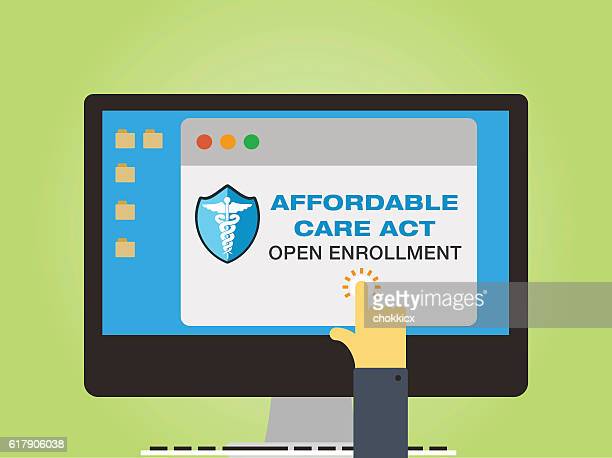Health Insurance Without a Job – Health insurance is essential to staying healthy and protecting oneself from unforeseen medical expenses and obtaining health insurance can be a challenge for individuals without a job.
While many people obtain health insurance through their employer, it’s not the only option available. There are several ways to get health insurance without a job.
In this article, I will discuss how to get health insurance without a job.
RELATED
Health Insurance Without a Job

Medicaid, CHIP, and through Health Insurance Marketplace
Purchase coverage through the Health Insurance Marketplace
The Health Insurance Marketplace, also known as the Health Insurance Exchange, is an online platform where individuals and families can purchase health insurance plans. The marketplace was created as part of the Affordable Care Act (ACA) to provide a centralized location for consumers to compare and purchase health insurance plans.
How to apply
To access the marketplace, you can visit the website healthcare.gov or call the marketplace call center. Once you create an account, you can browse plans from different insurers based on cost, coverage, and other factors. The marketplace offers four levels of plans – Bronze, Silver, Gold, and Platinum – with different levels of cost-sharing and benefits.
Pros:
- The marketplace offers a variety of health insurance plans from different insurers, giving consumers the ability to choose a plan that best fits their needs and budget.
- Depending on your income and family size, you may qualify for premium tax credits that can help make your health insurance more affordable.
- The marketplace allows you to easily compare plans based on cost, coverage, and other factors.
- The Affordable Care Act requires insurers to provide coverage to everyone, regardless of their pre-existing conditions.
Cons:
- Some plans on the marketplace may have a limited network of healthcare providers, which could restrict your choice of doctors and hospitals.
- While the marketplace offers affordable premiums, some plans may have high deductibles and other out-of-pocket costs that could add up quickly.
- The website and call center may experience technical issues, which could delay your enrollment or access to information about your plan.
- If you don’t enroll in a health insurance plan during the open enrollment period or a special enrollment period, you may be subject to a penalty.
Medicaid
Medicaid is designed to help people who may not be able to afford health insurance or medical care on their own. It is a government-funded program that provides health insurance to low-income individuals and families in the United States.
Medicaid covers a wide range of medical services, including doctor visits, hospital care, lab tests, prescription drugs, and more.
How to apply
Many states have expanded their Medicaid eligibility requirements under the Affordable Care Act, which means that more people may now qualify for Medicaid than in the past.
To apply for Medicaid, individuals can visit their state’s Medicaid website or office, or they can apply through the Health Insurance Marketplace.
Here are some pros and cons of Medicaid:
Pros:
- Medicaid offers low-cost or free coverage to individuals and families who meet the income requirements. This can be a significant help for those who may not be able to afford private insurance.
- Medicaid covers a wide range of medical services, including doctor visits, hospital care, lab tests, prescription drugs, and more. This can help ensure that individuals receive the care they need without worrying about the cost.
- Medicaid covers pre-existing conditions, which means that individuals with pre-existing conditions can get the care they need without worrying about being denied coverage or paying more for it.
- Many states have expanded their Medicaid eligibility requirements under the Affordable Care Act, which means that more people may now qualify for Medicaid than in the past.
Cons:
- Some Medicaid plans may have limited provider networks, making it difficult to find a provider who accepts Medicaid.
- Enrolling in Medicaid can be a complex process, and the program may have complex rules and regulations that can be difficult to navigate.
- While Medicaid covers many medical services, some populations, such as adults without children, may have limited benefits in some states.
- Medicaid is funded by both the federal and state governments, and budget constraints can sometimes lead to changes in the program or reductions in benefits.
Children’s Health Insurance Program (CHIP)
CHIP is designed to help families who may not qualify for Medicaid but cannot afford private health insurance. It is a government-funded program that provides low-cost or free health insurance to children and teens who are under the age of 19 and whose families have low to moderate incomes.
CHIP covers a wide range of medical services, including doctor visits, hospital care, dental care, vision care, and prescription drugs.
How to Apply
Families can apply for CHIP through their state’s Medicaid or CHIP program, or they can apply through the Health Insurance Marketplace.
CHIP eligibility is based on income and family size, and each state sets its eligibility criteria and benefits. Some states may have different names for their CHIP programs, such as “Healthy Kids” or “KidCare.”
Here are some pros and cons of the Children’s Health Insurance Program (CHIP):
Pros:
- CHIP offers low-cost or free coverage to families who meet the income requirements. This can be a significant help for families who may not be able to afford private insurance.
- CHIP covers a wide range of medical services, including preventive care, which can help ensure that children receive the care they need to stay healthy.
- CHIP covers pre-existing conditions, which means that children with pre-existing conditions can get the care they need without worrying about being denied coverage or paying more for it.
- Many states have expanded their CHIP eligibility requirements under the Affordable Care Act, which means that more children may now qualify for CHIP than in the past.
Cons:
- CHIP is primarily designed to provide coverage for children and teens so it may have limited coverage options for adults.
- Some CHIP plans may have limited provider networks, making it difficult to find a provider who accepts CHIP.
- Enrolling in CHIP can be a complex process, and the program may have complex rules and regulations that can be difficult to navigate.
- CHIP is funded by both the federal and state governments, and budget constraints can sometimes lead to changes in the program or reductions in benefits.
Affordable Care Act (ACA)

The Affordable Care Act (ACA), also known as Obamacare, is a federal law that was passed in 2010 to help make healthcare more affordable and accessible for Americans. One of the key provisions of the ACA is the establishment of the Health Insurance Marketplace, which offers insurance plans that comply with the law’s requirements for coverage and affordability.
How to apply
If you are interested in applying for ACA insurance, you can do so through their Website or Health Insurance Marketplace.
Pros:
- ACA-compliant insurance plans must cover essential health benefits, which can help ensure that individuals have access to the care they need.
- The subsidies available through the Health Insurance Marketplace can significantly reduce the cost of insurance premiums for low- and moderate-income individuals and families.
- ACA insurance plans cannot deny coverage or charge higher premiums based on pre-existing conditions.
Cons:
- Even with subsidies, ACA insurance can still be expensive for some individuals and families.
- Some ACA insurance plans may have limited provider networks, making it difficult to find a provider who accepts the plan.
- Enrolling in ACA insurance can be a complex process, and the program may have complex rules and regulations that can be difficult to navigate.
- The ACA has been a politically divisive issue, and changes to the law or its implementation can create uncertainty for individuals and families who rely on it for coverage.
Best Health Insurance Without a Job

- Blue Cross Blue Shield: Blue Cross Blue Shield offers health insurance plans in many states, and some of their plans are available through the Health Insurance Marketplace. They also offer short-term health insurance plans, which may be a good option for individuals who need temporary coverage. Get Quotes>>>
- Cigna: Cigna is another large insurance company that offers individual health insurance plans. They offer a variety of plans with different levels of coverage and pricing options. Get Quotes>>>
- United Healthcare: United Healthcare offers health insurance plans for individuals and families, including short-term health insurance plans. They also offer plans through the Health Insurance Marketplace in some states. Get Quotes>>>
- Kaiser Permanente: Kaiser Permanente is a health system that offers health insurance plans in select states. They offer both HMO and PPO plans, and their plans often include coverage for preventive care and wellness services. Get Quotes>>>
- Aetna: Aetna offers individual health insurance plans in some states, including plans with lower premiums and higher deductibles that may be a good fit for individuals without a job. Get Quotes>>>
- Ambetter: Ambetter offers health insurance plans in many states, including plans through the Health Insurance Marketplace. Their plans often feature low premiums and may include additional benefits like telehealth services and wellness programs. Get Quotes>>>
- Humana: Humana offers individual health insurance plans in select states, including HMO and PPO plans. They also offer short-term health insurance plans that can provide temporary coverage for individuals without a job. Get Quotes>>>
- Oscar: Oscar is a newer health insurance company that offers individual health insurance plans in select states. They offer a variety of plans with different levels of coverage, and their plans often feature telehealth services and a mobile app for managing your health. Get Quotes>>>
- Molina Healthcare: Molina Healthcare offers health insurance plans in many states, including plans through the Health Insurance Marketplace. Their plans often feature low premiums and may include additional benefits like transportation assistance and vision care. Get Quotes>>>
- Bright Health: Bright Health offers individual health insurance plans in select states. Their plans often feature low premiums and may include additional benefits like virtual primary care and mental health services. Get Quotes>>>
- Pivot Health: Pivot Health offers short-term health insurance plans that can provide temporary coverage for individuals without a job. Their plans often feature low premiums and flexible coverage options. Get Quotes>>>
- National General: National General offers short-term health insurance plans that can provide temporary coverage for individuals without a job. Their plans often feature low premiums and flexible coverage options. Get Quotes>>>
- eHealth: eHealth is a health insurance marketplace that allows you to compare plans from multiple insurance companies. They offer plans for individuals and families and can help you find coverage even if you are unemployed. Get Quotes>>>
- Avera Health Plans: Avera Health Plans is a regional health insurance company that offers individual health insurance plans in select states. Their plans often feature low premiums and may include additional benefits like wellness programs and telehealth services. Get Quotes>>>
Getting health insurance without a job can be challenging, but the several options listed above will make it easier for you. It is important to consider factors like premiums, deductibles, copays, and the network of providers included in the plan when shopping for health insurance, as well as any additional benefits or features offered by the plan. It is also a good idea to compare multiple plans and get quotes from different insurance companies to find the best fit for your needs and budget. Speaking with a licensed insurance broker can also help navigate the options available to you.
RELATED
- How to Improve Your Health with Nigerian Food
- Health Insurance Without a Job
Frequently Asked Questions
Here are some frequently asked questions about getting health insurance without a job:
What is the lowest income to qualify for Medicaid?
For states that have expanded Medicaid, the income is typically around $17,774 per year for an individual, and $36,570 per year for a family of four, as of 2023. For states that have not expanded Medicaid, the income is typically lower and can vary depending on the state.
Does Minnesota have free healthcare?
Minnesota does not have free healthcare, but the state does offer several programs to help individuals and families access affordable healthcare. One such program is Medical Assistance (MA), which is Minnesota’s Medicaid program.
Can I get health insurance if I’m unemployed?
Yes, there are several options available for individuals without a job, including Medicaid, CHIP, the Health Insurance Marketplace, and short-term health insurance plans.
What should I consider when shopping for health insurance?
When shopping for health insurance, it’s important to consider factors like premiums, deductibles, copays, and the network of providers included in the plan.
How can I find the best health insurance plan for me?
The best health insurance plan for you will depend on your individual needs and budget.

